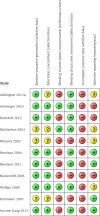Early interventions to prevent psychosis: systematic review and meta-analysis
- PMID: 23335473
- PMCID: PMC3548617
- DOI: 10.1136/bmj.f185
Early interventions to prevent psychosis: systematic review and meta-analysis
Erratum in
- BMJ. 2013;346:f762
Abstract
Objective: To determine whether any psychological, pharmacological, or nutritional interventions can prevent or delay transition to psychotic disorders for people at high risk.
Design: Systematic review and meta-analysis.
Data sources: Embase, Medline, PreMedline, PsycINFO, and CENTRAL were searched to November 2011 without restriction to publication status.
Review methods: Randomised trials comparing any psychological, pharmacological, nutritional, or combined intervention with usual services or another treatment. Studies of participants with a formal diagnosis of schizophrenia or bipolar disorder were excluded. Studies were assessed for bias, and relevant limitations were considered in summarising the results.
Results: 11 trials including 1246 participants and eight comparisons were included. Median sample size of included trials was 81 (range 51-288). Meta-analyses were performed for transition to psychosis, symptoms of psychosis, depression, and mania; quality of life; weight; and discontinuation of treatment. Evidence of moderate quality showed an effect for cognitive behavioural therapy on reducing transition to psychosis at 12 months (risk ratio 0.54 (95% confidence interval 0.34 to 0.86); risk difference -0.07 (-0.14 to -0.01). Very low quality evidence for omega-3 fatty acids and low to very low quality evidence for integrated psychotherapy also indicated that these interventions were associated with reductions in transition to psychosis at 12 months.
Conclusions: Although evidence of benefits for any specific intervention is not conclusive, these findings suggest that it might be possible to delay or prevent transition to psychosis. Further research should be undertaken to establish conclusively the potential for benefit of psychological interventions in the treatment of people at high risk of psychosis.
Conflict of interest statement
Competing interests: All authors have completed the Unified Competing Interest form at
Figures





Comment in
-
Can we identify and treat "schizophrenia light" to prevent true psychotic illness?BMJ. 2013 Jan 18;346:f304. doi: 10.1136/bmj.f304. BMJ. 2013. PMID: 23335475 No abstract available.
References
-
- Bebbington P, Brugha T, Meltzer H, Farrell M, Ceresa C, Jenkins R, et al. Psychiatric disorder and dysfunction in the UK National Survey of Psychiatric Morbidity. Soc Psychiatry Psychiatr Epidemiol 2000;35:191-7. - PubMed
-
- Bebbington P, Brugha T, Coid J, Crawford M, Deverill C, D’Souza J, et al. Adult psychiatric morbidity in England, 2007. Results of a household survey. NHS Information Centre for Health and Social Care, 2011.
-
- Mueser KT, McGurk SR. Schizophrenia. Lancet 2004;363:2063-72. - PubMed
-
- Bloom DE, Cafiero ET, Jané-Llopis E, Abrahams-Gessel S, Bloom LR, Fathima S, et al. The global economic burden of noncommunicable diseases. World Economic Forum, 2011. www3.weforum.org/docs/WEF_Harvard_HE_GlobalEconomicBurdenNonCommunicable....
-
- Mangalore R, Knapp M. Cost of schizophrenia in England. J Ment Health Policy Econ 2007;10:23-41. - PubMed
Publication types
MeSH terms
Substances
LinkOut - more resources
Full Text Sources
Other Literature Sources
Medical
